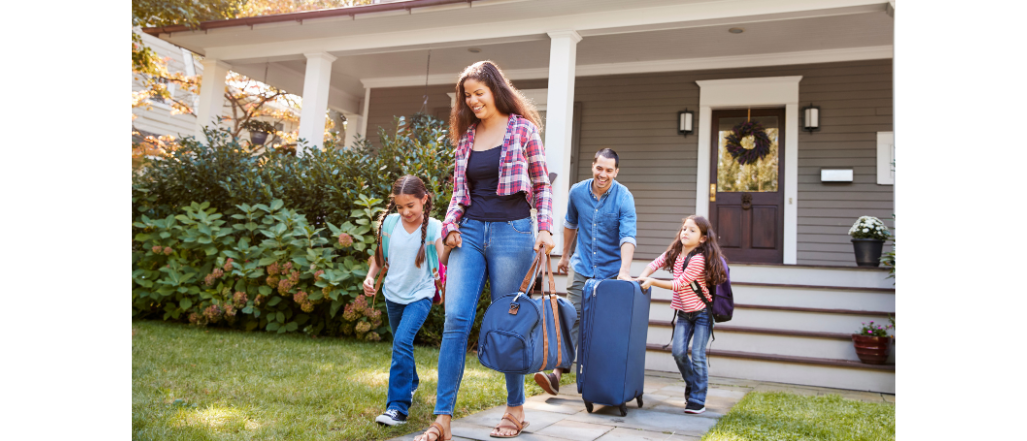Whether you’re out of town on vacation or have to leave for an extended business trip, or you’ve learned that a home nearby was burgled, concerns about the security of your home are bound to arise.
The FBI’s 2019 crime statistics (2019 is the most recent year for which data are available) show that home burglaries represent 16 percent of the estimated number of property crimes in the U.S.
With the holiday season fast approaching, how can homeowners protect their property when they are far from home? There are a number of home security tips that can help you to protect your property while away.

How can I protect my home while I’m on vacation?
Make it look like your home is lived in
This is an obvious tip, but it is so important it’s worth listing first. If a burglar thinks you are home, they are likely to pass up your home and instead look for an easier target.
- Lights on timers, both inside and outside of your home, are good options. Consider installing motion-detecting lights.
- With smart home features, you can program all kinds of things with the right components and setup. Automatic blinds that raise and lower either on timers or responding to light, or Fake TVs, which are gadgets that emit the same type of flickering lights a television does, are just two of the types of tools now available to make it look like you are home when you are not.
- If any of your neighbors are having family over for the holidays, offer your driveway to park their cars—this is particularly useful if you live in an area that gets snowfall since untouched snow on front paths and driveways can be an indicator that no one is around.
- Because uncleared snow is such a visible sign, consider paying a neighbor, local teen, or snowplow service to be available to clear your drive and walkways if there’s a chance of snow while you will be gone.
- Stop mail delivery, especially if you have a home mailbox. Not only is accumulated mail a sign no one is home, it can also make you vulnerable to identity theft or stolen checks.
Lock doors and windows
Locking your doors and windows is another easy but important step, and it applies to all of them, even ones on the second floor. Homeowners may overlook how things like back decks, trellises, or covered porches can provide easy access to the second floor. Pair that with unlocked second-floor windows and you’ve made it far easier for your home to be burgled.
Be smart about where you place valuables
Don’t put high-value items right in front of windows. For example, if you have a first-floor bedroom with a chest of drawers placed in front of the window, don’t place a jewelry box on top. Small electronics, cash, and watches should all be stored away and not left out where they can be seen by someone through a window.
Landscaping for security
It’s not just decorative garden trellises that can ease access to a home. Landscaping around any entrances, including windows and doors, can provide a hiding spot for would-be burglars. Trees and shrubs can create blind spots for any security cameras or motion detection lights that you install. While you might not have the time or budget to overhaul your landscaping before heading out on vacation, some strategic pruning or clearing might be worth your time if you identify a really vulnerable spot, such as dense shrubbery around a back window.
Think carefully about what you share on social media
Would you tell a random stranger at the gas station that your home will be vacant for the next ten days? Even if your accounts are set to private, wait until you return to post pictures of your travels. Settings such as “share with friends of friends” or accidentally posting publicly increase the risk that the wrong person will learn no one is at your home.
Protect your home with alarm and camera systems
Alarm systems that work in conjunction with cameras are better than cameras alone if you’re trying to deter theft, rather than just having a recording to show to police after the fact. Still, having cameras—particularly a combination of visible and not-visible ones—is better than not having them. Smart home systems that include alarms offer another important benefit for homeowners on vacation: they can alert you to issues such as water leaks that could cause extensive damage if you weren’t aware of them until you came home.
Remove spare keys
If you keep spare keys outside the home, particularly in easy and logical places like under a rock or flower pot right beside a side or back door, remove them before you travel. If you’ve asked a neighbor to check in on your home periodically while you are away, give them the key rather than telling them where it is located outside. If someone knows or suspects you are out of town, leaving a key outside your house is a risk.
Consider the weather before shutting off your HVAC
One step many homeowners take before heading off on vacation is turning off the heat or air conditioning, to save money on energy while gone. However, if extreme temperatures are a possibility, this may do more harm than good—subzero temps during a cold snap can cause your pipes to freeze, while high temperatures in a closed house can ruin medications and force your refrigerator to work hard to maintain its temperature.
Does homeowners insurance cover me on vacation?
Generally speaking, your homeowners insurance liability coverage does cover you while you are traveling, but it’s a good idea to read your policy and understand exactly what is and is not covered while you are travelling. For example, if two golf carts are in a collision on a course and you’re responsible for the accident in which another golfer was injured, your homeowners liability coverage may cover any fees associated with the injury and legal costs.
If you are traveling outside of the U.S., different rules—including local laws—will apply. Your homeowners insurance coverage might not be able to cover you when traveling overseas, so check before you travel abroad.
Are my possessions covered by homeowners insurance while I am on vacation?
Again, the answer is a qualified ‘yes’—depending on a few factors. If you are on vacation and your home is robbed, your homeowners insurance should protect against theft. However, your homeowners policy will have established limits. If you have jewelry, art, expensive electronics or camera equipment, or other high-value collections, you will need additional insurance to make certain you are fully covered for a loss.
The same holds true for items you have with you when you are on vacation, if your policy covers “off-premises” events. If, for example, you are on vacation and your jewelry is stolen, your homeowners insurance will cover the loss (minus your deductible) up to the limit established in your policy. If you have an additional valuable personal property rider or specialized jewelry insurance, those are the policies that will apply.

How can I get a homeowners insurance quote?
A homeowners insurance policy should fit the way you live, including protecting you and your home when you travel. If you want to learn more about what different homeowners insurance policies cover, or if you are interested in getting quotes, contact the experts at Rate Insurance today. They’ll take the time to make sure that you have a policy that meets your needs and protects your belongings.
Disclaimer:
*Savings, if any, vary based on the consumer’s profile and other factors. Contact your insurance agent for more information. Restrictions apply.
All information provided in this publication is for informational and educational purposes only, and in no way is any of the content contained herein to be construed as financial, investment, or legal advice or instruction. Rate Insurance does not guarantee the quality, accuracy, completeness or timelines of the information in this publication. While efforts are made to verify the information provided, the information should not be assumed to be error free. Some information in the publication may have been provided by third parties and has not necessarily been verified by Rate Insurance. Rate Insurance, its affiliates and subsidiaries do not assume any liability for the information contained herein, be it direct, indirect, consequential, special, or exemplary, or other damages whatsoever and howsoever caused, arising out of or in connection with the use of this publication or in reliance on the information, including any personal or pecuniary loss, whether the action is in contract, tort (including negligence) or other tortious action.

